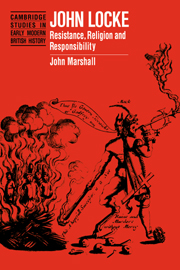Book contents
- Frontmatter
- Contents
- Acknowledgements
- List of abbreviations
- Introduction: Locke's intellectual development
- PART I RELIGION AND THE POLITICS OF TOLERATION
- 1 Against the ‘tyranny of a religious rage’
- 2 Restoration churchmanship and the ‘Essay on Toleration’
- 3 Undermining the temple of worship of priest and prince
- 4 The theology of a reasonable man 1667–83
- PART II RESISTANCE AND RESPONSIBILITY
- PART III HERESY, PRIESTCRAFT AND TOLERATION; JOHN LOCKE AGAINST THE ‘EMPIRE OF DARKNESS’
- Conclusion
- Bibliography
- Index
- Cambridge Studies in Early Modern British History
4 - The theology of a reasonable man 1667–83
Published online by Cambridge University Press: 07 January 2010
- Frontmatter
- Contents
- Acknowledgements
- List of abbreviations
- Introduction: Locke's intellectual development
- PART I RELIGION AND THE POLITICS OF TOLERATION
- 1 Against the ‘tyranny of a religious rage’
- 2 Restoration churchmanship and the ‘Essay on Toleration’
- 3 Undermining the temple of worship of priest and prince
- 4 The theology of a reasonable man 1667–83
- PART II RESISTANCE AND RESPONSIBILITY
- PART III HERESY, PRIESTCRAFT AND TOLERATION; JOHN LOCKE AGAINST THE ‘EMPIRE OF DARKNESS’
- Conclusion
- Bibliography
- Index
- Cambridge Studies in Early Modern British History
Summary
Locke had read the broadly Arminian works of Hammond, Hales and Allestree around 1660. He was apparently interested in the case for a broadly Arminian view of the necessity of a working faith rather than Calvinist justification by faith alone by 1667. Among his manuscripts is an eight-page part of a draft for a sermon, most probably of January 1666/7. That this draft is among Locke's papers suggests that he had preserved it throughout his life and thus throughout the many moves of his papers. The manuscript of this draft is in a hand that is very similar in many respects to Locke's own hand, but a number of letters are formed in ways that Locke employed occasionally but not usually. It may just possibly be by Locke himself, although this seems unlikely. At the least, it suggests that Locke was aware by 1667 of arguments setting out a ‘moral theology’ similar to much Latitudinarian and Arminian thought; at the most it would indicate that these themes had already become important in Locke's own thought.
The text for the sermon was Gal. 5:6, on faith ‘which worketh by love’. Against the Calvinist contention that Christ's righteousness was imputed to man (infused in man), having been apprehended by faith, this sermon declared that ‘faith shall be imputed’ (counted) to the individual ‘for righteousnesse’.
- Type
- Chapter
- Information
- John LockeResistance, Religion and Responsibility, pp. 119 - 154Publisher: Cambridge University PressPrint publication year: 1994



